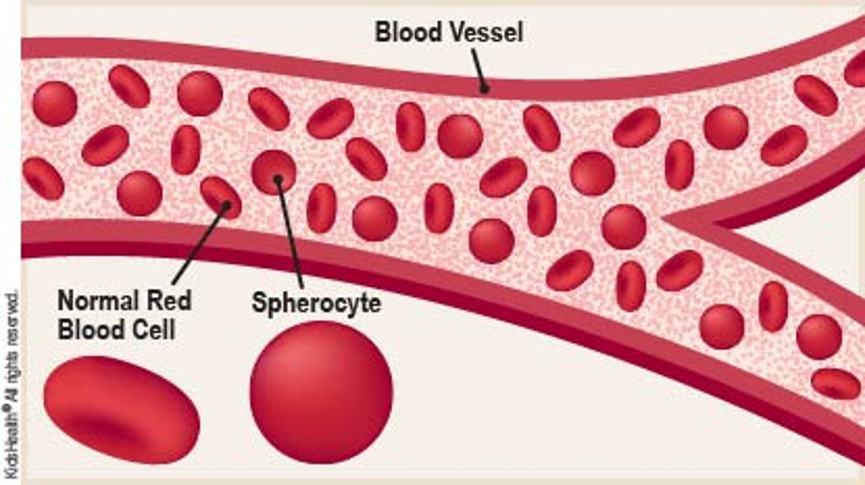Hereditary spherocytosis (HS) is an inherited red blood cell disorder. In North America, HS affects 1 in 5000 births. It is the most common cause of inherited chronic hemolysis, which is the breakdown of red blood cells.
HS occurs because of mutations in the genes involved in making the red blood cell membrane. Normal red blood cells are shaped like flat discs with indentations on both sides, whereas in hereditary spherocytosis, red blood cells are spherical, hence the name. Because of this abnormal shape, the red blood cell’s lifespan is reduced, leading to hemolysis.
In the neonatal period, HS may manifest as jaundice secondary to hemolysis. This is because the breakdown of the red blood cells produces bilirubin, a yellow substance that accumulates in the blood and causes the characteristic yellowing of the skin seen in jaundice. Babies may also have signs of anemia such as pale skin, fatigue, and feeding intolerance.
How does someone inherit hereditary spherocytosis?
It is estimated that 1 in 4 cases of HS are due to spontaneous mutations that are not passed down through the family. Of the remaining cases, about 75% are inherited in an autosomal dominant fashion. This means that a child of an affected parent and an unaffected parent has a 50% chance of having HS.
How is hereditary spherocytosis diagnosed?
Initial testing includes a complete blood count, which shows us various characteristics of the patient’s red blood cells, the Coombs test, which shows whether hemolysis involves the immune system, and a peripheral smear, which involves an expert looking at the shape of red blood cells under a microscope. The expected results would include Coombs negative hemolytic anemia and spherocytes on peripheral smear.
If any of the above tests suggest HS, the next step involves tests to confirm the suspected diagnosis. The osmotic fragility test is old and the gold standard but may miss up to 25% of HS cases. Other confirmatory tests include RBC band 3 protein reduction, EMA binding, and AGLT.
Is there anything we can do to treat it?
Depending on the severity of disease, there are different strategies for treating HS. Treatment may involve phototherapy or exchange transfusions for jaundice, blood transfusions, and folic acid supplements. It is important to prevent and monitor for future exacerbations which can be caused by infections. For those with more severe HS, sometimes splenectomy (removal of the spleen) is warranted.





